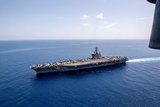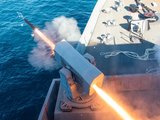USN orders more incremental availability work for USS Gerald R Ford
The USN carrier Gerald R. Ford pictured in 2017 after completing sea trials. (Photo: USN/ Mass Communication Specialist 2nd Class Kristopher Ruiz)
Huntington Ingalls Newport News is to conduct ‘planned incremental availability’ work on the nuclear-powered aircraft carrier USS Gerald R. Ford, the DoD announced on 28 July.
Work on a $94.8 million delivery order from the USN is scheduled for completion by March 2022.
In June 2019, the USN awarded Huntington Ingalls a $687 million cost-plus-fixed-fee, IDIQ contract for early service life period work on the Gerald R. Ford, which entered service in 2017 as the first ship in its class. The work included support ship repair and modernisation during continuous maintenance and emergent maintenance during the early service period.
Shephard Defence Insight notes that the four Gerald R Ford-class carriers will be at the forefront of US power projection over the next 50 years as they enter service, employing new technologies that will enhance operational capabilities far beyond their predecessors.
More from Naval Warfare
-
![European navies line up $105.8 billion in unawarded contracts for 2026]()
European navies line up $105.8 billion in unawarded contracts for 2026
France, Germany and Italy lead the way on unawarded naval defence opportunities that could be awarded this year, but across Europe countries are ramping up their spending efforts to face geopolitical challenges.
-
![RTX Raytheon targets nearly 170% RAM production increase to meet global demand]()
RTX Raytheon targets nearly 170% RAM production increase to meet global demand
The US multinational company is currently assembling 300 Rolling Airframe Missile rounds per year, with plans to reach 800 units annually after significant investment and modernisation of its facilities.
-
![Spain’s F100 upgrade mirrors Aegis modernisation paths in allied navies]()
Spain’s F100 upgrade mirrors Aegis modernisation paths in allied navies
The Spanish Navy’s Alvaro de Bazan-class of air defence frigates will receive the latest Aegis Weapon System technology among other modernisations to extend the service life to 2045.
-
![UK’s Fleet Solid Support ship programme deemed on track despite steel supply concerns]()
UK’s Fleet Solid Support ship programme deemed on track despite steel supply concerns
Shipbuilders are saying the programme is going ahead on time as the government estimates 7.7 million tonnes of steel are needed for 2026 infrastructure projects.
-
![Raytheon unveils details of its proposal for the US Navy/NATO ESSM Next Significant Variant]()
Raytheon unveils details of its proposal for the US Navy/NATO ESSM Next Significant Variant
In an exclusive interview with Shephard, Raytheon’s VP of Shipboard Missiles disclosed what improvements the company plans to offer for the Sea Sparrow NSV.






















